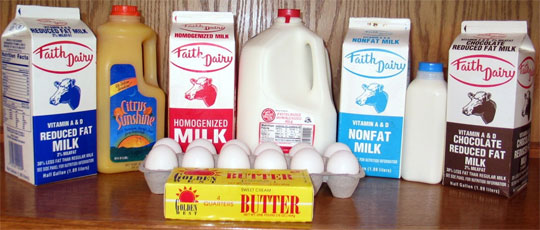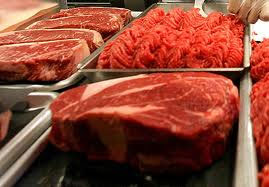Food Safety Begins At The Market And Ends At Home
May 30, 2011
A refrigerator can be full of surprises. Wilted lettuce, dried out cheese, apples which have lost their crispness, and other similar surprises inhabit the very best refrigerators. All are victims of improper food storage, and they represent thousands of dollars which consumers unwittingly throw away each year.
 Cash in on proper food storage by giving groceries a little extra care with you bring them home from the supermarket. You’ll save money and the food you buy will stay fresh longer, retain more nutritional value, and remain safe to eat.
Cash in on proper food storage by giving groceries a little extra care with you bring them home from the supermarket. You’ll save money and the food you buy will stay fresh longer, retain more nutritional value, and remain safe to eat.
Proper food storage begins at the supermarket. The way we shop can affect food quality. Many shoppers remember to put fragile fruits and vegetables on top of sturdier items in the grocery cart, but then let the ice cream melt while they wait in line at the deli or bakers. A better solution would be to put frozen and refrigerated foods into the cart last, particularly if you have a lot of shopping to do. You can also ask the person bagging your groceries to put refrigerated and frozen foods in the same bag. These items will keep each other colder on the trip home, plus putting the groceries away becomes less of a chore if everything that belongs in the refrigerator or freezer is in the same bag.
 The trip between the checkout counter and your kitchen needs to be as short as possible. When perishable food items sit in the car for any length of time, they lose quality and begin to spoil. It’s a good idea to stop at the dry cleaners and post office before doing the grocery shopping.
The trip between the checkout counter and your kitchen needs to be as short as possible. When perishable food items sit in the car for any length of time, they lose quality and begin to spoil. It’s a good idea to stop at the dry cleaners and post office before doing the grocery shopping.
At home “think cold”. Under the right conditions bacteria can grow rapidly. The refrigerator temperature won’t kill bacteria, but the cold will slow the growth of most bacteria. Frozen and refrigerated foods require the most care and should be put away first. Dairy products, poultry, meat, fish, eggs, and most fresh vegetables and fruit, plus custards and whipped-cream-filled pastries are a few of the grocery items that need to be refrigerated promptly.
Some food items require special handling. Taking care of these foods before you store them in the refrigerator will save time as well as money. Iceberg lettuce, for example, keeps better if you remove the core and store the head in an airtight container or resealable plastic bag. Fresh meat, poultry, and fish which are not pre-packaged need to be rewrapped and stored in the coldest part of the refrigerator or freezer. Meats should always be stored in the meat keeper drawer or on lower shelves to prevent cross-contamination of foods.
 Storage times still vary even when groceries are carefully wrapped and refrigerated promptly. Berries and other fragile fruits, for example, have the best flavor and texture when eaten within a few days of purchase. Apples and citrus fruits can be stored for up to several weeks or more in the refrigerator. Most fresh meats will keep several days. Fish, poultry, and ground meats, however, should be cooked or frozen within one to two days.
Storage times still vary even when groceries are carefully wrapped and refrigerated promptly. Berries and other fragile fruits, for example, have the best flavor and texture when eaten within a few days of purchase. Apples and citrus fruits can be stored for up to several weeks or more in the refrigerator. Most fresh meats will keep several days. Fish, poultry, and ground meats, however, should be cooked or frozen within one to two days.
Storing refrigerated foods properly and for the recommended times may not be enough, especially if your refrigerator gets too warm. It is a good idea to keep a refrigerator thermometer on a shelf in the fridge. The thermometer should always register 40ºF or less. In the summer it is a good idea to keep the refrigerator colder than usual because this is the time of the year when family members make frequent trips in and out of the refrigerator.
 Often we remember to protect foods when we picnic away from home, but tend to forget that refrigerated foods still require special care when carried only as far away as the backyard. A few simple precautions will ensure these foods are as safe to eat as they are delicious: For backyard barbeques, leave meat, poultry, and fish in the refrigerator until the grill is ready, then grill just what you think you will need and serve promptly. Wait to bring out salads and other cold accompaniments until you are ready to begin serving.
Often we remember to protect foods when we picnic away from home, but tend to forget that refrigerated foods still require special care when carried only as far away as the backyard. A few simple precautions will ensure these foods are as safe to eat as they are delicious: For backyard barbeques, leave meat, poultry, and fish in the refrigerator until the grill is ready, then grill just what you think you will need and serve promptly. Wait to bring out salads and other cold accompaniments until you are ready to begin serving.
For more information regarding food safety and other related topics, go to the University of Florida’s Solutions for Your Life website: http://www.solutionsforyourlife.com.
Submitted by, Dorothy C. Lee, CFCSm Family and Consumer Sciences Agent, Escambia County, dclee@ufl.edu




Comments